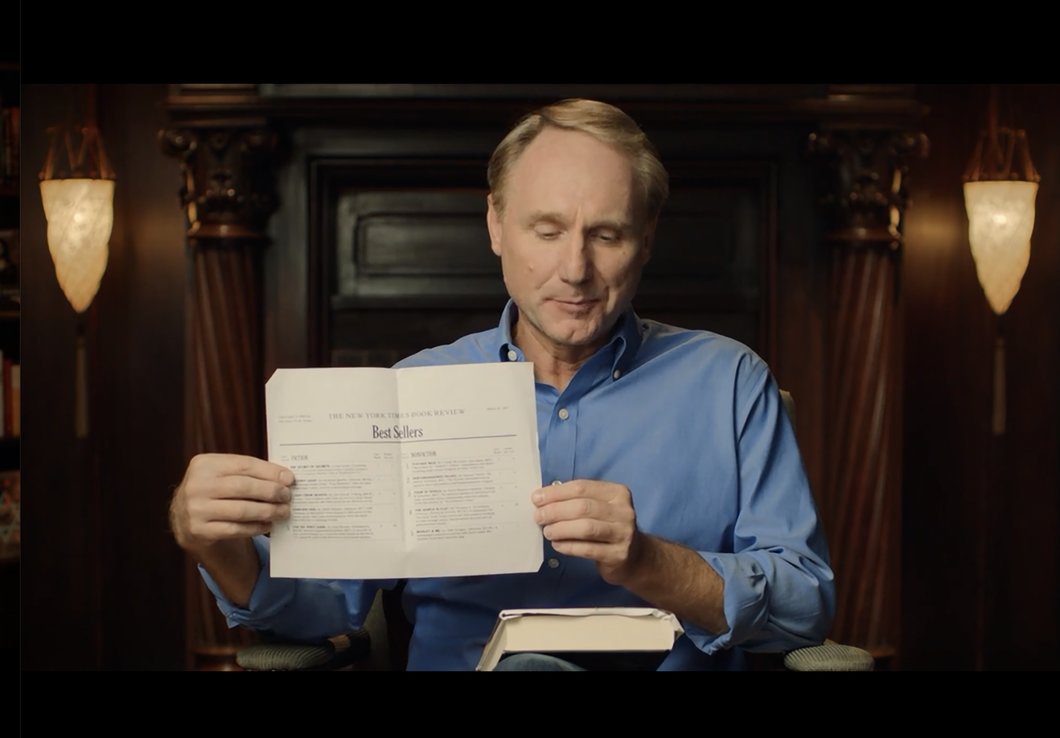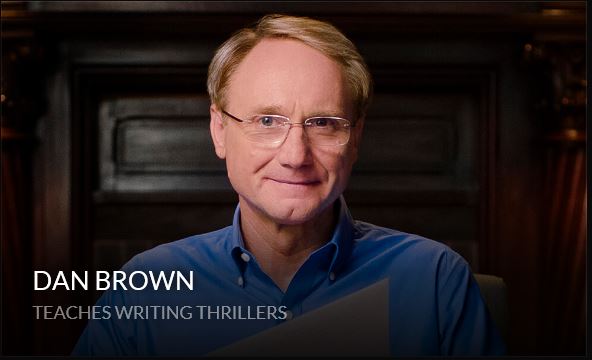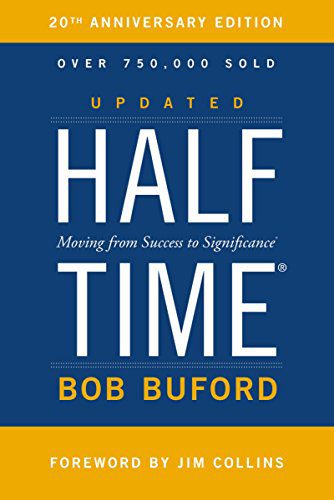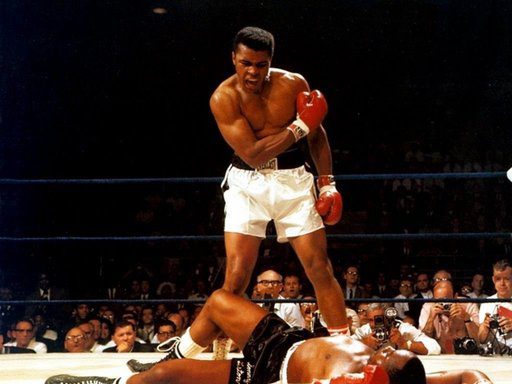Dan Brown is the author of numerous notable novels, including The Da Vinci Code, which has become one of the bestselling novels of all time as well as the subject of intellectual debate among readers and scholars. Brown’s novels are published in 56 languages around the world with over 200 million copies in print.
The son of a mathematics teacher and a church organist, Brown was raised on a prep school campus where he developed a fascination with the paradoxical interplay between science and religion. These themes eventually formed the backdrop for his books.
Here are my favourite takeaways from watching Dan Brown’s Masterclass.com Session on Writing Thrillers:
Storytelling is the oldest human art form.
Whether spoken, or in a book, or in a painting, or even in a piece of music, storytelling has always had at its core a single consistent ambition: to capture and sustain our attention.
On Writing:
If you’ve ever taken a writing class, you’ve probably heard the familiar advice: “Write what you know” and “Show, don’t tell.” While these maxims can be helpful, they won’t get you through the complicated task of writing a novel. Dan acquired his tools the way most writers do: by reading books and writing his own. But as a writer who has successfully practiced sustaining a reader’s attention over the course of seven novels, his advice goes well beyond using writerly sleight-of-hand to build suspense.
- It involves finding your individual passions, understanding the nuances of depicting a world, developing specific research techniques, and learning skills that allow surprising connections to be made between your plotlines and characters.
Dan acquired his tools the way most writers do: by reading books and writing his own.
The Anatomy of a Thriller: The Three C’s
Suspense is all about making promises. It’s about telling a reader, ‘I know something you don’t know. And I promise, if you turn the page, I’m going to tell you
Suspense begins with the three C’s: the contract, the clock, and the crucible.
- The Contract
– The contract is an implied promise you make to the reader about what will be delivered by the end of the book.
– It is crucial in storytelling that you keep every single promise you have made, no matter how trivial.
- The Clock
– Clock refers to the fact that adding time pressure to any character’s struggle will create higher stakes and more interest for your reader.
– The goal of the clock is not to be stunningly original but to invest your story with a pressure that will prompt conflicts and intense responses from your characters.-
- The Crucible
– Think of the crucible as a box that constrains your characters, offers them no escape, and forces them to act. Your story should present an increasingly difficult series of tasks and situations for the hero that will funnel him into the most severe trial of all.
– You must make sure that each successive task is harder than the previous one and that, for the hero, there is no escape. If readers begin to sense that the journey is becoming easier, they will lose interest.
What makes a book a thriller is the pace at which the promises are kept. Questions you raise for the reader are often answered quickly and will lead to more questions. The questions with the biggest stakes are revealed more slowly throughout the course of the novel.
- On Reading
Dan emphasizes reading as a critical step in becoming a great writer.
- You might read to learn, to enjoy a story, or to look for inspiration, but when you start to write a novel, you should begin reading with a critical eye.
- Study how other writers are practicing the craft.
- Find the things that thrill you, and learn from the things that don’t.
- Pay attention to the way your favorite novels are put together. You’ll be using all this information in crafting your own novel.

Finding the Idea
What do I want to know?
- This crucial question should be your jumping-off point. You’ll hear the advice to “write what you know.” Yet what draws forth our best energy and talent is often the desire to learn more about things we don’t know.
- The first step in finding the idea for your novel is to discover your world. Dan’s book Digital Fortress (1998) came from his urge to know more about national security, and so that became his world.
- Your choice should always be informed by your interests, so immerse yourself in books, television, movies, and anything else that inspires you. You’ll be silently accumulating the building blocks for your novel.
No matter how good your idea is, or how fast you write, the sheer size of the project means you’re going to be doing this for a long time. Choose a topic that you’re really excited about.

On Execution
Pretend the books are already published and write a marketing synopsis or book jacket copy for each of your ideas. Experimenting like this can help you get a better grasp of which of your ideas you most want to write.
Research
The harder you work at researching, the luckier you will get.
Whether you’re writing what you know or pursuing a fresh passion, research is a critical tool for developing the world of your novel.
What you learn during the research will allow you to immerse your reader fully in your setting. It will guide you in developing your characters, the novel’s moral gray area, and even the fundamental conflict of your story..
Dan’s rule of thumb: if it doesn’t serve the story, don’t use it. Research materials are like money in the bank—use what you need now and save the rest for the future.
- Remember that you don’t need to know everything, you just need to know enough to get started. You’ll continue doing research as you work on the novel, so begin writing as soon as you can.
Referenced/Recommended Books
- Mastering Suspense, Structure, and Plot (2016) by Author Jane K. Cleland.
- Writing Down the Bones (1986) by Natalie Goldberg
- iStory: Substance, Structure, Style, and the Principles of Screenwriting (1997) by Robert McKee
- Super Structure: The Key to Unleashing the Power of Story (2015), James Scott Bell
- Writing Fiction: A Guide to Narrative Craft by Janet Burroway
Recommended Resources
- NPR Top 100 Killer Thrillers
- Check out the first season of 24 (2001), a television show renowned for its real-time pacing and edge-of-your-seat suspense.
- For a fun look at the crucible aspect of thrillers, scan through these common “escape tropes” compiled by TVTropes and consider which, if any, you have used or would like to play around within your own story.
- Turn to these novels and television shows for some recent popular examples of antiheroes, or check out TVTropes extensive list.
- For inspiration, go online and visit The Book Trail, which bills itself as a “Literary Travel Agency.
About Masterclass
MasterClass is a streaming platform that makes it possible for anyone to learn from the very best. MasterClass is an online membership – accessible on your phone, web, Apple TV, Roku devices, and Amazon Fire TV – that offers classes on a wide variety of topics taught by 85+ world-class masters at the top of their fields.
Their immersive learning experiences combine incredible video content, downloadable materials, and social interaction with the MasterClass community, all of which users can explore at their own pace.
The annual membership is available for $180 USD, which allows unlimited access to ALL on demand MasterClass content for the year
Dan Brown Teaches Writing Thrillers
Give One Annual Membership. Get One Free.
MasterClass Annual Membership for only $180 USD
All the best in your quest to get better. Don’t Settle: Live with Passion.
For More Information: MasterClass Home Page



2 Comments
Pingback: Lessons Learned from David Baldacci’s Masterclass Session on Mystery and Thriller Writing. – Lanre Dahunsi
Pingback: Lessons Learned from N. K. Jemisin’s Masterclass Session on Fantasy and Science Fiction Writing. – Lanre Dahunsi